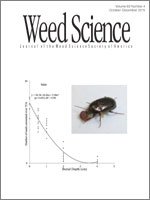Weeds are a significant problem in crop production and their management in modern agriculture is crucial to avoid yield losses and ensure food security. Intensive agricultural practices, changing climate, and natural disasters affect weed dynamics and that requires a change in weed management protocols. The existing manual control options are no longer viable because of labor shortages; chemical control options are limited by ecodegradation, health hazards, and development of herbicide resistance in weeds. We are therefore reviewing some potential nonconventional weed management strategies for modern agriculture that are viable, feasible, and efficient. Improvement in tillage regimes has long been identified as an impressive weed-control measure. Harvest weed seed control and seed predation have been shown as potential tools for reducing weed emergence and seed bank reserves. Development in the field of allelopathy for weed management has led to new techniques for weed control. The remarkable role of biotechnological advancements in developing herbicide-resistant crops, bioherbicides, and harnessing the allelopathic potential of crops is also worth mentioning in a modern weed management program. Thermal weed management has also been observed as a useful technique, especially under conservation agriculture systems. Last, precision weed management has been elaborated with sufficient details. The role of remote sensing, modeling, and robotics as an integral part of precision weed management has been highlighted in a realistic manner. All these strategies are viable for today’s agriculture; however, site-specific selection and the use of right combinations will be the key to success. No single strategy is perfect, and therefore an integrated approach may provide better results. Future research is needed to explore the potential of these strategies and to optimize them on technological and cultural bases. The adoption of such methods may improve the efficiency of cropping systems under sustainable and conservation practices.
How to translate text using browser tools
1 October 2015
Nonconventional Weed Management Strategies for Modern Agriculture
Ali A. Bajwa,
Gulshan Mahajan,
Bhagirath S. Chauhan
ACCESS THE FULL ARTICLE

Weed Science
Vol. 63 • No. 4
October-December 2015
Vol. 63 • No. 4
October-December 2015
allelopathy
biotechnology
crop nutrition
Herbicide resistance
precision agriculture
weed management




